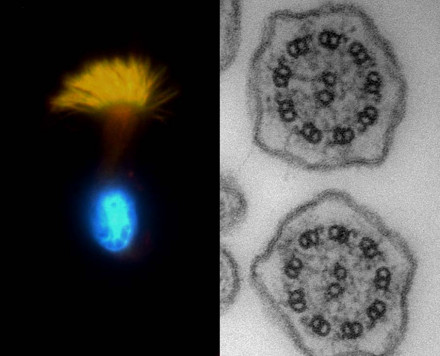Primary ciliary dyskinesia (PCD) is a genetic disease characterized by reduced motility of cilia and related structures in various organ systems. The most clinically significant manifestations of the disease are those resulting from impaired airway clearance, i.e. recurrent sinusitis, bronchitis and otitis media. Chronic inflammation can result in bronchial remodelling, called bronchiectasis. Other symptoms include malformations of the internal organs (usually situs viscerum inversus totalis), which result from involvement of the nodal cilia involved in determining the right-left axis of the embryo, and fertility disorders, both in men and women. The inheritance of the disease is mostly autosomal recessive.
The laboratory of the Department of Histology and Embryology was involved in the establishment of the Centre for Disorders of the Ciliated Epithelium at Motol University Hospital. Electron microscopic and immunofluorescence examinations of ciliated cells contribute to the enormous increase in the number of newly detected patients with PCD, which allows for early treatment and improved prognosis. During the course of the four-year AZV grant, the number of patients diagnosed with PCD has more than doubled.

